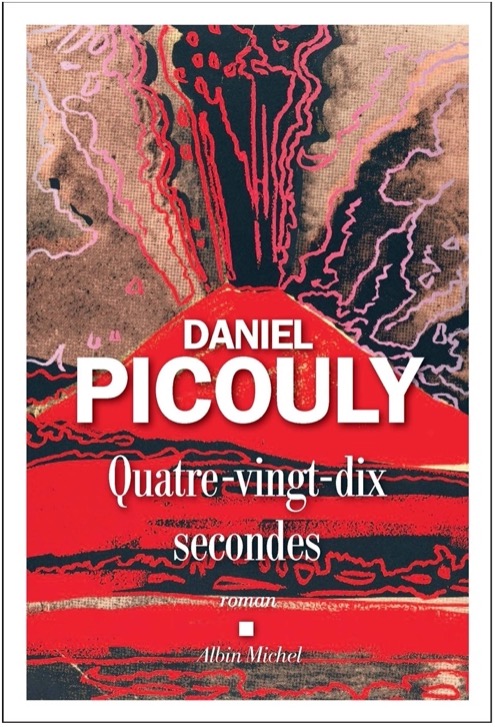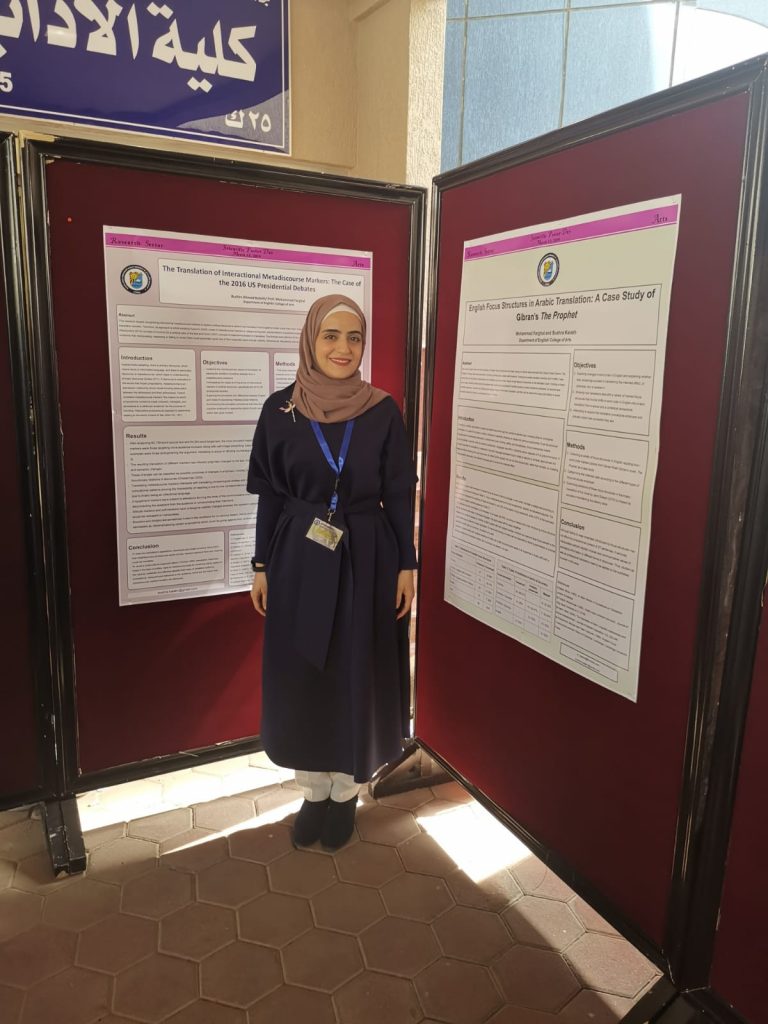This post is part of our Research Initiation Scheme for 2020-2021. It brings together write-ups, by three different undergraduate students, of presentations given as part of a Research in Progress Workshop by Postgraduate Research Students in Modern Languages on 26 February 2021. The talks covered were by Margaret Cunningham, Jordan McCullough, and Bushra Kalakh, and the workshop was chaired by Dr Ricki O’Rawe.
Margaret Cunningham, French
Anyone who has read a historical novel will know that fictional writing can recover and reinvent the past in ways which rejuvenate long forgotten narratives and perspectives. This quality of historical fiction is particularly important in post-colonial contexts where indigenous and local stories are too easily overlooked and silenced. In her talk on the 26th February, Margaret Cunningham (PhD student in French at QUB) gave a fascinating insight into this topic.

In a presentation entitled ‘Multiperspectivity and Memory: Rewriting Disaster in the French Caribbean’, Margaret addressed disaster literature in the French Caribbean, with particular focus on fictional accounts of the 1902 eruption of Mount Pelée on the island of Martinique. In this presentation, Margaret examined the ways in which Martinican author Daniel Picouly bears witness to and measures the cultural effects of this disaster in his book Quatre-vingt-dix secondes (90 Seconds).
The French Caribbean, Margaret explained, has a long history of suffering. Not only is it vulnerable to natural disaster, but French colonization meant that the islands have a turbulent history, rife with tyranny and social unrest. Because of this, there is a contentious social climate in Martinique, with controversy surrounding memories and intense debate over which anniversaries should be celebrated. Margaret argued that literature plays a crucial role in navigating debate surrounding Martinique’s troubled past and becomes a vehicle to produce new cultural memory. Through the fictional rewriting of real historical events, authors can recover and reinvent the past, repressing trauma and prioritizing certain perspectives and narratives.
Daniel Picouly’s book Quatre-vingt-dix secondes recounts the story of the 1902 eruption of Mount Pelée, the worst volcanic disaster of the twentieth century. This book is written from the perspective of a number of non-human focalizers, including a mountain, a bird, a corpse and the primary narrator: Mount Pelée itself. These narrators, endowed with human emotions and cognitions, are used by Picouly to represent the range of responses to the eruption, both contemporary and of the time. The voices highlight the plurality of experience as well as the multiple and changing conceptualizations over time. Margaret also spoke about the importance of place in the construction of memory in the Martinican context: where there is a lack of native peoples, memory must be found in the island’s topography.
Neglect of nature is another theme Margaret explored in Picouly’s book. In the fable-like tale, it is ultimately the inability of the people of Saint-Pierre to listen to nature’s signs that leads them to their death. Margaret linked this idea to the construction of disaster narratives in other colonial narratives. She explained that traumatic memory related to colonized pasts is often represented in the form of anxieties around gender and sexuality. She cited the work of the French author, Patrick Chamoiseau, who presents the female body as the primary site of memory. Chamoiseau’s writing also addresses the theme of disregarding nature, which is expressed through the language of a violated female slave.
It was interesting to consider how literature can be used as a tool to recover a traumatized collective past and give voice to alternative narratives which have been silenced. Margaret’s presentation encouraged me to think about the intersecting relationship between time, space and memory. It used the work of Picouly to exemplify the changeable nature of memory which has the potential to be rewritten and re-understood as spaces take on new meanings.
Report by Ida Willock-Creese, final-year undergraduate in Anthropology and Spanish
Jordan McCullough, French
On Friday 26 February 2021, the Queen’s Languages research community came together to showcase a selection of their PhD candidates’ latest work. Their projects touched on how language affects politics and societies and how our individual and community identities contribute to a dynamic research environment at a time when connection and solidarity are increasingly important. Chaired by Dr. Ricki O’Rawe, the showcase celebrated a range of interdisciplinary projects with a global focus under the theme of Narrations of Suffering and Recovery. It was fascinating to see elements from activism in translation to the role of literature in personal and collective suffering to minority language legislation, focusing on a variety of languages, cultures and nations.

In light of this, I would like to focus on one presentation in particular. At a time when many have experienced unimaginable suffering and loss, grief remains something that we struggle to effectively understand. Jordan McCullough’s doctoral project in French, informed by Medical Humanities, aims to shed light on the contemporary parental récit de deuil (grief narrative) through examining the role of writing in the suffering and recovery of parents who have lost a child, answering the question of why they write and how they do it. I was thoroughly interested by the nuanced discussion on grief, questioning the idea of mourning for a set period and moving on. Rejecting the idea that bereaved parents should sever ties with their lost children and subscribe to a ‘cult of resilience’, this project aims to underline that grief is not a linear project of moving from suffering to recovery but an ongoing element of bereaved parents’ lives.
This project interrogates our collective commercialization of grief as currency to produce creative work. Rather than aiming for a catharsis to transition out of this suffering or a medicalization of the human experience through scriptotherapy, Jordan explores the radical departure from ideas of moving past grief by emphasizing the importance of connection in these narratives. He advocates instead for the continuing bonds perspective of an ongoing relationship between parent and child through the space of the text. This also allows parents to explore their ongoing identity as parent as they mobilize their suffering, using the text as a connective space to continue to parent their loved ones.
Giving a brief summary of the strategies of direct address, forms of dialogue and epistolary forms, in his presentation Jordan underlined that connection, not catharsis, informs all functions of the text, as parents write narratives in which they can receive a ‘response’ and feel the presence of their child. Far from being a cry into the void as we often see it, Jordan showcased these texts as a way of communicating the incommunicable and engaging with a loved one beyond death in an atemporal space. Exploring the publication context, Jordan’s groundbreaking project underlines how, in our society where children’s death unfortunately leads to the rejection of parental grieving experiences and their parental identity, these texts are a tool to give these parent-child relationships legitimacy and to create a legacy for them by entrusting them to us, the readers. I am excited to see how this project continues to inspire change in an environment where it is needed now more than ever.
Report by Lauren McShane, final-year undergraduate in French and Spanish
Bushra Kalakh, Translation and Interpreting

At the Postgraduate Research in Progress Workshop, PhD student Bushra Kalakh (Translation and Interpreting, QUB) spoke about her ongoing research in a presentation titled Narratives of Human Rights: Activism Through Translation in Palestine. Bushra’s presentation examined human rights discourse, and the multi-modal nature of activist texts that narrate human suffering within it. She specifically dealt with human rights texts that relate to the rights, or lack thereof, of Palestinians within the context of the Israeli-Palestinian conflict.
She began by bringing us back to 1948, a key date in the contextualisation of her research for two reasons. The first is that it was the year in which the Universal Declaration of Human Rights was published, a UN document that preserves the rights and freedoms of all people. The second reason is that it marked the year of the creation of Israel as a nation state. Bushra noted that whilst many refer to this as a great feat in its establishing of a Jewish homeland, it also led to the exodus of Palestinian Arabs known as the Nabka, which literally translates from Arabic to mean ‘catastrophe’.
Bushra went on to explain that what this conflict can show within the context of the language of human rights is its innate paradoxes. That is to say: what is the narrative of the oppressed when two groups sharing similar narratives of victimhood and oppression both dispute the rights to one land?
She noted that the narratives of human rights vary amongst different human rights organisations, and that sometimes activism is limited in relation to human rights violations by use of political language.
Bushra then presented examples of ways in which language and images can be utilised in the fight against human rights abuses, structuring the content within the parameters of different rights. Activism for the right to exist was demonstrated through the use of a graphic that depicts the changing borders of Israel, with years specifically chosen to show interventions that reduced the size of Palestinian territories.
The right to return was depicted through a visual that shows the vast amount of Palestinian villages in Israel that were never built over, indicating that it is feasible for Palestinians to return to Israel even though their right to do so is systematically denied.
The right to self-defence was shown in one instance through the visualisation of loss of land in an Arabic language video with English subtitles, showing the bureaucratic impediments that Palestinians often face from the Israeli military in the West Bank.
Bushra ended her presentation by remarking on how the different modalities of activism like maps or videos work to empower activists in human rights discourse. She also considered how ideas of loss and recovery can translate into each other, and become synonymous depending on the angle of a human rights narrative.
I really enjoyed hearing about Bushra’s research as it informed me of the ways in which human rights activism takes shape in the digital sphere. I also appreciated Bushra’s comments during the Q and A session regarding her personal connection with the conflict, and how this related to the challenge of objectivity in her research. She said the help of her supervisors was very useful in achieving objectivity, but also highlighted the importance of preserving her own voice too, which is an invaluable message for any postgraduate student: maintaining objectivity is possible whilst maintaining your sense of self.
Report by Eleanor Gilmore, final-year undergraduate in Spanish and Portuguese